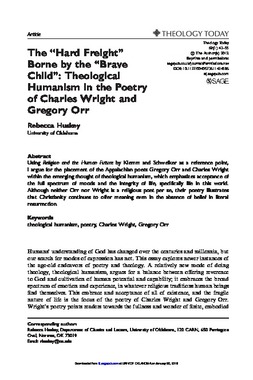| dc.contributor.author | Rebecca Huskey | |
| dc.date.accessioned | 2016-01-14T19:52:47Z | |
| dc.date.accessioned | 2016-03-30T15:35:08Z | |
| dc.date.available | 2016-01-14T19:52:47Z | |
| dc.date.available | 2016-03-30T15:35:08Z | |
| dc.date.issued | 2012-04-01 | |
| dc.identifier.citation | Huskey, R. (2012). The “Hard Freight” Borne by the “Brave Child”: Theological Humanism in the Poetry of Charles Wright and Gregory Orr. Theology Today, 69(1), 43-55. doi: 10.1177/0040573611434586 | en_US |
| dc.identifier.uri | https://hdl.handle.net/11244/24898 | |
| dc.description.abstract | Using Religion and the Human Future by Klemm and Schweiker as a reference point, I argue for the placement of the Appalachian poets Gregory Orr and Charles Wright within the emerging thought of theological humanism, which emphasizes acceptance of the full spectrum of moods and the integrity of life, specifically life in this world. Although neither Orr nor Wright is a religious poet per se, their poetry illustrates that Christianity continues to offer meaning even in the absence of belief in literal resurrection. | en_US |
| dc.language.iso | en_US | en_US |
| dc.publisher | Theology Today | |
| dc.subject | theological humanism | en_US |
| dc.subject | poetry | en_US |
| dc.subject | Charles Wright | en_US |
| dc.subject | Gregory Orr | en_US |
| dc.title | The “Hard Freight” Borne by the “Brave Child”: Theological Humanism in the Poetry of Charles Wright and Gregory Orr | en_US |
| dc.type | Research Article | en_US |
| dc.description.peerreview | Yes | en_US |
| dc.description.peerreviewnotes | https://us.sagepub.com/en-us/nam/manuscript-submission-guidelines | en_US |
| dc.identifier.doi | 10.1177/0040573611434586 | en_US |
| dc.rights.requestable | false | en_US |
